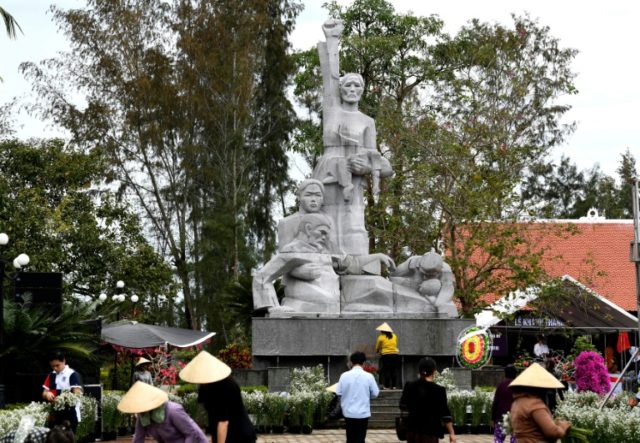Quang Ngai (Vietnam) (AFP) – Pham Thanh Cong doesn’t remember much about the day his family was killed in front of him by American troops in the My Lai massacre. He was only 11, and blacked out after a grenade hit the bunker they were hiding in.
But in the five decades since the March 16, 1968 killings that left 504 villagers dead — mostly unarmed women, children and older men — he has dedicated his life to keeping the memory of one of the war’s worst atrocities alive.
“I’m devoted to this to protect the memories of the massacre, to let people know about the brutality of the American army,” Cong told AFP from the war memorial which he ran until his retirement last year.
But still, he dredges up memories of that dark day with some reluctance, admitting he’s still haunted by the violence in Son My village, which the Americans called My Lai during the war.
“When recalling it, I couldn’t sleep well at night. The memories returned — the pain, the loss of myself and my family — making me very sad,” said Cong, expressionless.
He had huddled with his mother, brother and sister in a bunker in his home when American helicopters landed in nearby rice paddies in Son My in central Vietnam, believed to be a hotbed of Viet Cong resistance.
Soldiers lobbed grenades at the family and shot at them with M-16s. He says he stayed in the hut from 8:00 am until 4:00 pm, when his father wandered in and found him alive.
– Never again –
The massacre, uncovered in 1970 by American investigative reporter Seymour Hersh, polarised public opinion and energised a mounting anti-war movement in the US.
Though it took years for the American public to learn about My Lai — the largest and best documented of several suspected mass killings by the US during the war — the communist North reported the massacre much earlier in broadcasts dismissed as “red” propaganda.
Today, Cong dutifully recounts the painful day as a matter of posterity, to ensure it never happens again.
Vietnam’s surging young population — about half of the country’s 93 million people are under the age of 30 — are mostly looking away from the war today, focused instead on getting good jobs, premier league football, or the latest mobile phone app.
Cong says recalling the massacre is a way to “warn against war and protect peace”.
Others in Quang Ngai province are less willing to be drawn into the discussion, some bitter at how little their lives have improved since the end of the war that left an estimated three million Vietnamese dead.
Although paved roads and brick buildings have started to reshape parts of the province in recent years, some residents still struggle to eke out a meagre living from farming or fishing.
“Our life is bad… we face difficulties, many families are in need”, said Nguyen Ngoc Long, a rock scavenger who was just two years old when he saw his cousin killed in the massacre.
Despite their losses during the conflict, villagers like Long who did not fight in the war are not entitled to official veterans’ compensation from the government.
“We are just civilians so we must accept the losses of not having support at all,” said Truong Thi Hong, 76, whose mother and brother were killed.
– ‘Peace, not war’ –
Vietnam’s communist government is marking 50 years since the massacre on Friday with an official ceremony at the memorial site that Cong used to run, where the names of 504 victims are etched into a stone wall.
A group of US veterans are also attending the ceremony, a sign of how far relations have come between the United States and Vietnam, former foes who now enjoy a cosy alliance.
Vietnam has welcomed four American presidents since the end of the war, and today the United States is one of its top trading partners and closest Western allies.
Cong, steadily focused on looking ahead without forgetting the pat, said he would welcome his former enemies to the village where his family was once slaughtered.
“Now the point is looking towards future, and the country’s development… we want peace, not war… not because we are forgetting the war or the crimes of American troops. We are putting the past behind, we don’t want to hold onto hatred.”

COMMENTS
Please let us know if you're having issues with commenting.